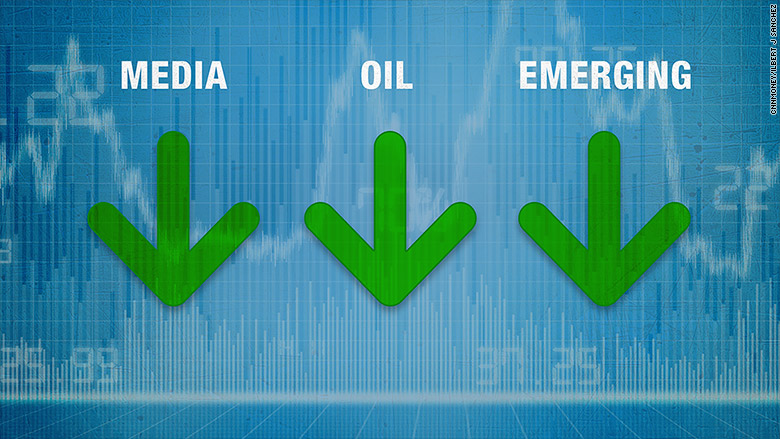
Global stock markets are getting rocked.
U.S. markets are bouncing back Tuesday after declines five days in a row.
Amid all the volatility, sometimes the best time to buy is when there's blood in the streets, as a famous investor once said.
"You get the best buys when doom and gloom are present. That's how investing works," says Kevin Carter, chairman of EMQQ index, an emerging markets index.
Three areas stand out as the biggest losers this time.
Even before Monday's sell off, oil stocks had tanked for months, media companies have been pummeled in August and emerging markets just can't catch a break.
Let's break down the three areas:

1. Oil stocks
Oil prices are sitting at six-and-a-half year lows. A global oversupply of oil is driving energy stocks down. Exxon (XOM) stock is down 29% from a year ago. Royal Dutch Shell has slid 35%, and Chevron (CVX)'s stock has tanked 42% over the same time frame.
Fadel Gheit, an oil analyst at Oppenheimer & Co., argues that if you look at the history of oil prices, it has never stayed low for several years. Eventually it will rebound, but in the near term Gheit warns that investors looking to make a quick buck are "on your own."
Related: Oil meltdown shakes stocks
Investors who buy now may have to wait "three to five" years before they start to see a healthy return on investment, he says.
"Longer term, all of these stocks are buying opportunities," says Gheit. There's "significantly overwhelming odds that oil stocks will be a lot higher than they are today 3-5 years from now."
Takeaway: Oil stocks represent a buying opportunity if you're willing to be patient.
Related: Strong U.S. dollar could cause currency crisis
2. Emerging markets
Stock markets in developing countries are tanking and their currencies are fast losing value.
Commodities are a growth engine for many of these countries. But from copper and iron ore to tin, nickel and oil, prices of commodities have fallen off a cliff. China is often their biggest trade partner, and its economy is slowing down quickly.
This year has been pretty gloomy for emerging markets, and there are headwinds in the future. It's unclear when things will settle down in China. And with the U.S. Federal Reserve preparing for a rate hike, it could lead investors to pull out money from overseas markets back into the U.S.
However, some of these international investments have become so cheap that it might be worth considering, especially for those who want to diversify.
Related: Trading was halted 1,200 times Monday
"It is a good time to buy," says Gerardo Rodriguez, head of emerging markets multi-asset management at BlackRock. He notes: "Yes, value has become attractive but economic reality is complex."
Emerging markets are certainly very cheap compared to U.S. stocks right now. For example, BlackRock's iShares emerging market ETF is down 27% from a year ago. It's about $33 a share.
By contrast, if you want to invest in the U.S., the most popular ETF -- SPDR's S&P 500 ETF -- is down just 3% from a year ago and trades at $193 a share.
One key metric -- the price to earnings ratio -- is much lower for most emerging market stocks than U.S. stocks.
Rodriguez and other experts argue that patient investors who get in now could see gains over the long haul. Carter, the emerging market index chairman, sees the most growth in consumer-related ETFs in emerging markets.
Takeaway: It's a rocky road in the near term, but there are bargains to be had for long-term investors.
Related: How I made money when the Dow fell 1,000 points
3. Media stocks
Media stocks have had an awful August on increased anxiety over the future of cable television.
Most major media companies depend on monthly subscriber fees for cable channels. But there's pressure from streaming competitors and broad behavioral changes, where subscribers want only a narrow selection of channels and are unwilling to pay for the entire bundle.
These concerns are making investors hit the sell button.
Disney (DIS), CBS (CBS), Discovery (DISCA) and Viacom (VIA) have all suffered double digit losses this month. Time Warner (TWX), CNN's parent company is down too.
Related: Asia's richest man lost $13 billion in crash
But media experts aren't calling this a buying opportunity yet. The future business model for these media companies is very uncertain with all the debate about "unbundling" channels.
The popularity of Netflix (NFLX) and Hulu has made it harder to lure top talent for their shows -- and to keep the ever-important audience of young viewers, experts say.
"Wall Street is taking a 'wait and see' approach," says Brad Adgate, a TV analyst at Horizon Media. "These media companies have to reset companies and what that reset button does remains to be unseen."
Takeaway: Better to wait and see for media stocks.


